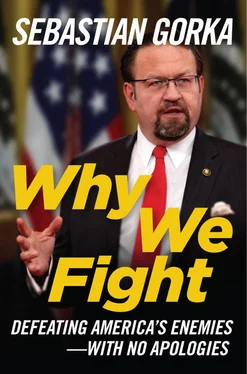In fact, Jefferson was well versed in the threat posed to America by the jihadists of North Africa. In 1786, when he was the US ambassador in Paris and the Barbary pirates were already attacking unprotected American vessels, he and John Adams, then our ambassador in London, asked the ambassador of Tripoli, Sidi Haji Abdrahaman, what right his co-religionists had to extort moneys from Western nations and to take Christians into slavery. They reported his reply to Secretary of State John Jay and Congress in a letter, reproduced in full as an appendix to this book, that has lain in unjustified obscurity, though every American ought to have reread it the day after the 9/11 attacks. Jefferson and Adams wrote:
We took the liberty to make some inquiries concerning the Grounds of their pretentions to make war upon Nations who had done them no injury, and observed that we considered all mankind as our friends who had done us no wrong, nor had given us any provocation.
The Ambassador answered us that it was founded on the Laws of their Prophet, that it was written in their Koran, that all nations who should not have acknowledged their authority were sinners, that it was their right and duty to make war upon them wherever they could be found, and to make slaves of all they could take as Prisoners, and that every Musselman who should be slain in battle was sure to go to Paradise.
This is the real reason Thomas Jefferson owned a Koran. No proto-multiculturalist, he simply wanted to understand the threat jihadism posed to his young nation.
More than a million Christians having been taken prisoner and enslaved by the North Africans, and finally in a position to do something about it, President Jefferson took action. On June 1, 1801, the first US naval squadron to cross the Atlantic—consisting of USS Philadelphia , Essex , Enterprise , and eventually New York —set sail under the command of Commodore Richard Dale, First Lieutenant Decatur assigned to the thirty-two-gun Essex . Their orders: to intercept and engage the Barbary pirates menacing American shipping. The First Barbary War was about to erupt.
Before the squadron reached North Africa, one of the Barbary States preemptively declared war on the United States. And with two warships already positioned off Gibraltar, Tripoli’s forces were well-positioned to engage the US vessels. But when they were challenged by the American squadron, forced into the same harbor by adverse weather, the Tripolitan captains pleaded ignorance of the state of war. Given the speed of communications at that time, this could indeed have been true. But leaving the Philadelphia in the port to observe and guard the two Barbary warships, Dale and the rest of his squadron sailed on. The fate of the Philadelphia would turn Decatur into a national hero, a true American warrior who would sally into the heart of enemy territory and send the clearest of signals to anyone who believed that the new nation of America could be treated as a vassal and our people victimized.
OPERATION USS PHILADELPHIA: THE MARINE CORPS’ FIRST COVERT ANTI-JIHADIST MISSION
In 1803, having run aground on a reef outside the port of Tripoli, the Philadelphia was captured by Ottoman corsairs and her crew taken prisoner. This time, America would not surrender. Decatur sailed for Tripoli with USS Intrepid , disguised as a British merchant vessel, and USS Syren , carrying a handpicked team of marines. Mission: locate and liberate the Philadelphia . Or if that should prove impossible, destroy her so she could never be used against other US vessels or remain a prized trophy of the Tripolitans.
The Intrepid , piloted by a Sicilian who was included on the mission because he spoke Arabic, sailed into Tripoli harbor under a British flag as the sun set on February 16, 1804, its Marine Corps boarding party concealed below deck. The plan was to tell the Arabic-speaking harbormaster that the merchant vessel had lost its anchor and needed to shelter in the harbor to make repairs. Without raising suspicions, the disguised team drew closer and closer to the captured Philadelphia until they were miraculously allowed to tie their vessel to the Barbary booty of war. Darkness was all around; now was the time to strike and neutralize the corsair crew aboard the Philadelphia .
At just the right moment, Decatur yelled to his sixty marines, dressed as Maltese sailors, to board and recapture the Philadelphia . The Muslim pirates were taken totally by surprise, as the marines clambered aboard, swords drawn. The ship was recaptured in minutes, with only one American wounded and twenty Tripolitans killed.
As soon as the ship had been restored to its rightful owner, the United States Navy, Lieutenant Decatur realized that she could not be freed from where she lay; the Intrepid was simply too small to pull the Philadelphia out of the harbor to safety. But his instructions had been clear: if the Philadelphia could not rejoin the American fleet, no one would have her. And to that end, Decatur’s special assault team had prepared a cargo of flammable materials with which to scuttle their sister ship.
Decatur gave the order: the incendiary packets were brought aboard the Philadelphia and strategically placed so as to ignite a rapid conflagration that would consume the ship before anyone from shore could save her. The bundles were set alight and the ship was abandoned. Decatur stayed aboard until the very last moment to ensure that no jihadi pirate would ever use her again.
Almost straightaway, the loaded cannon on the Philadelphia started to detonate in the massive fire that engulfed the ship. Cannonballs whizzed across the harbor and spread confusion among the Tripolitans as Decatur and his special mission team made their escape on the Intrepid and the Syren .
Mission accomplished. The Philadelphia would no longer be a part of the Barbary fleet or adorn the Muslim harbor. And the unprecedented audacity of Decatur and his team, doing all this right under the noses of the court of Tripoli—well, that would make any jihadi think twice about taking on the new might of the Unites States.
The young naval officer who, five thousand miles from home, led this special operations mission—one of our nation’s first into Muslim territory—was barely twenty-five years old.
Vice Admiral, Viscount Nelson, the most celebrated British naval commander and hero of the Napoleonic Wars, is reported to have credited Decatur with “the most bold and daring act of the age.” And Pope Pius VII, after so many Christians had been killed or enslaved by the Barbary states, observed that “the United States, though in their infancy, had done more to humble and humiliate the anti-Christian barbarians on the African coast in one night than all the European states had done for a long period of time.”
As soon as Decatur arrived back on American soil, the secretary of the navy, Benjamin Stoddert, hurriedly recommended to President Jefferson that he be made a captain and the rank backdated to February 16, 1804, the night of the operation that restored America’s honor after decades of humiliation at the hands of jihadis. Jefferson concurred, and with that the twenty-five-year-old became Captain Stephen Decatur, United States Navy, the youngest American ever to hold the rank.
Now you know just how long our brave sailors and marines have been at war with the forces of jihad and why the Marines’ Hymn evokes “the shores of Tripoli,” as our Devil Dogs were an integral element of the First Barbary War, not only in Tripoli, but the Battle of Derna and beyond.
Читать дальше












